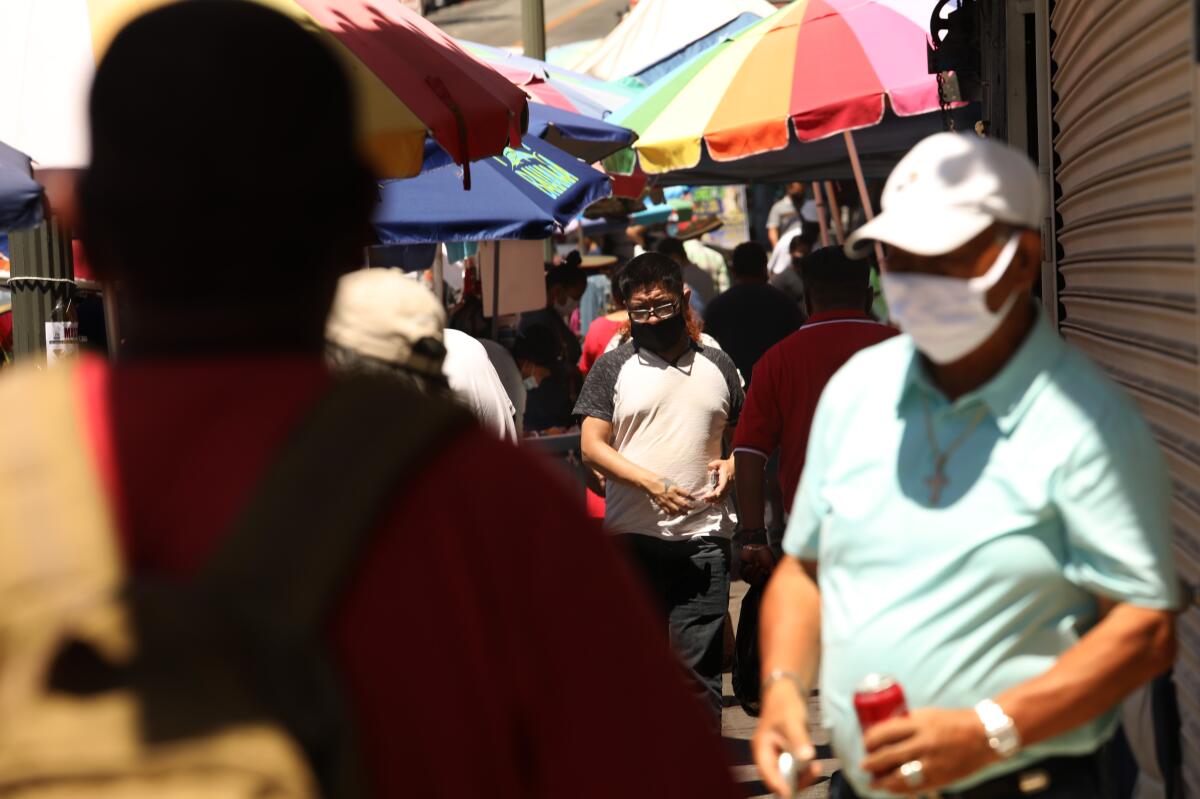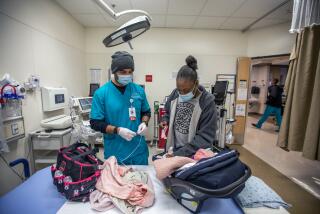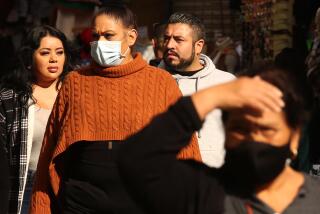Wearing masks could help you avoid major illness even if you get coronavirus, experts say

As health experts urge the public to wear masks to slow the spread of the coronavirus, they continue to get pushback. Among the arguments of skeptics: If masks can’t fully protect me against COVID-19, what is the point of wearing them?
Scientists’ counterargument is that masks can help reduce the severity of the disease caused by coronavirus even if you get infected.
There’s now mounting evidence that silent spreaders are responsible for the majority of transmission of the coronavirus — making universal masking essential to slow the spread of the highly contagious virus, experts say.
This makes the coronavirus different from the seasonal flu. With seasonal flu, peak infectiousness occurs about one day after the onset of symptoms. But with the coronavirus, even among people who do end up becoming visibly sick, peak infectiousness can occur before they show symptoms.
In fact, experts say, significant amounts of virus can start coming out of people’s noses and mouths even when they feel well.
This is a key reason, they say, why tactics to deal with the coronavirus must be markedly different than with the seasonal flu. And the universal wearing of masks is key. Here’s a Q&A based on research and interviews with medical experts.
What’s the point of wearing a cloth face covering if it doesn’t filter out everything?
Cloth face masks still provide a major protective benefit: They filter out a majority of viral particles.
As it turns out, that’s pretty important. Breathing in a small amount of virus may lead to no disease or a more mild infection. But inhaling a huge volume of virus particles can result in serious disease or death.
That’s the argument Dr. Monica Gandhi, UC San Francisco professor of medicine and medical director of the HIV Clinic at Zuckerberg San Francisco General Hospital, is making about why — if you do become infected with the virus — masking can still protect you from more severe disease.
“There is this theory that facial masking reduces the [amount of virus you get exposed to] and disease severity,” said Gandhi, who is also director for the Center for AIDS Research at UC San Francisco.
What evidence supports this theory?
The idea that a lower dose of virus means less severe illness is a well-worn idea in medicine.
Even going back to 1938, there was a study showing that by giving mice a higher dose of a deadly virus, the mice were more likely to get severe disease and die, Gandhi said.
The same principle applies to humans. A study published in 2015 gave healthy volunteers varying doses of a flu virus; those who got higher doses got sicker, with more coughing and shortness of breath, Gandhi said.
And another study suggested that the reason the second wave of the 1918-19 flu pandemic was the deadliest in the U.S. was because of the overcrowded conditions in Army camps as World War I wound down. “In 1918, the Army camps [were] characterized by a high number of contacts between people and by a high case-fatality rate, sometimes 5 to 8 times higher than the case-fatality rate among civilian communities,” the study said.
Finally, a study published in May found that surgical mask partitions significantly reduced the transmission of the coronavirus among hamsters. And even if the hamsters protected by the mask partitions acquired the coronavirus, “they were more likely to get very mild disease,” Gandhi said.
What happens if a city dramatically masks up in public?
If Gandhi is right, it may mean that even if there’s a rise in coronavirus infections in a city, the masks may limit the dose of virus people are getting and result in less severe symptoms of illness.
That’s what Gandhi says she suspects is happening in San Francisco, where mask wearing is relatively robust. Further observations are needed, she said.
There’s more evidence that masks can be protective — even when wearers do become infected. She cited an outbreak at a seafood plant in Oregon where employees were given masks, and 95% of those who were infected were asymptomatic.
Gandhi also cited the experience of those aboard a cruise ship that was traveling from Argentina to Antartica in March when the coronavirus infected people on board, as documented in a recent study. Passengers got surgical masks; the crew got N95 masks.
But instead of about 40% of those infected being asymptomatic — which is what would normally be expected — 81% of those testing positive were asymptomatic, and the masks may have helped reduce the severity of disease in people on board, Gandhi said.
What has happened in other countries where residents have masked up?
The protective effects are seen in countries where masks have been universally accepted for years, such as Taiwan, Thailand, South Korea and Singapore.
“They have all seen cases as they opened ... but not deaths,” Gandhi said.
The Czech Republic moved early to require masks, issuing an order in mid-March, Gandhi said; that’s about three months before Gov. Gavin Newsom did so statewide in California.
But in the Czech Republic, “every time their cases would go up ... their death rate was totally flat. So they didn’t get the severe illness with these cases going on.”
By May, the Czech Republic lifted its face mask rule. “And they’re doing great,” Gandhi said.
More to Read
Sign up for Essential California
The most important California stories and recommendations in your inbox every morning.
You may occasionally receive promotional content from the Los Angeles Times.











